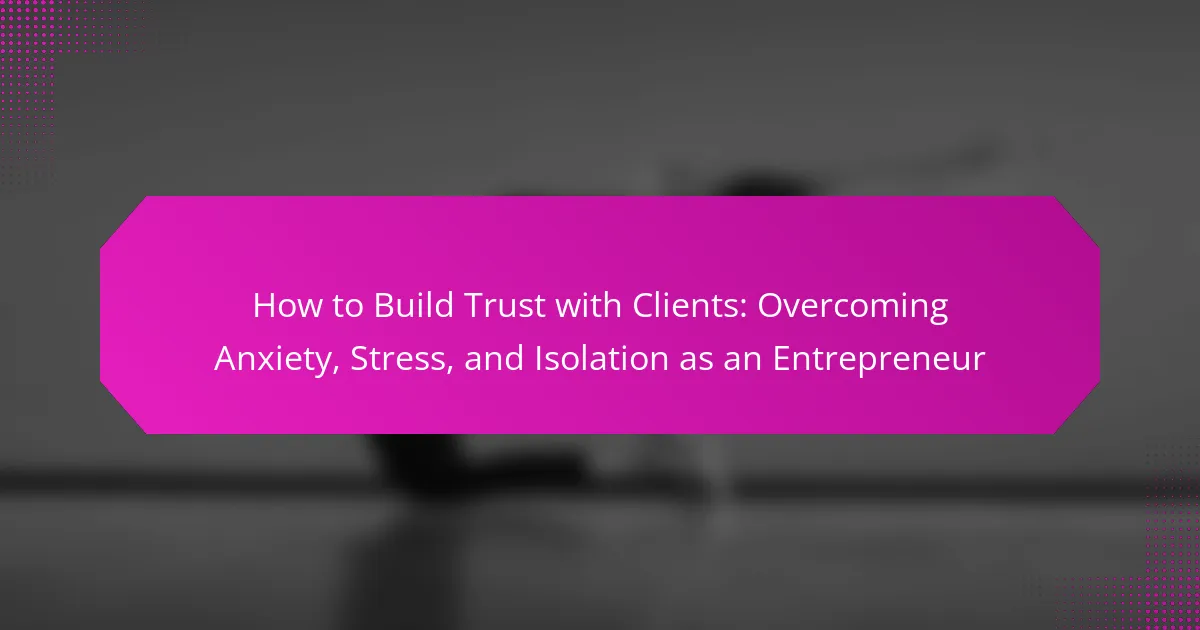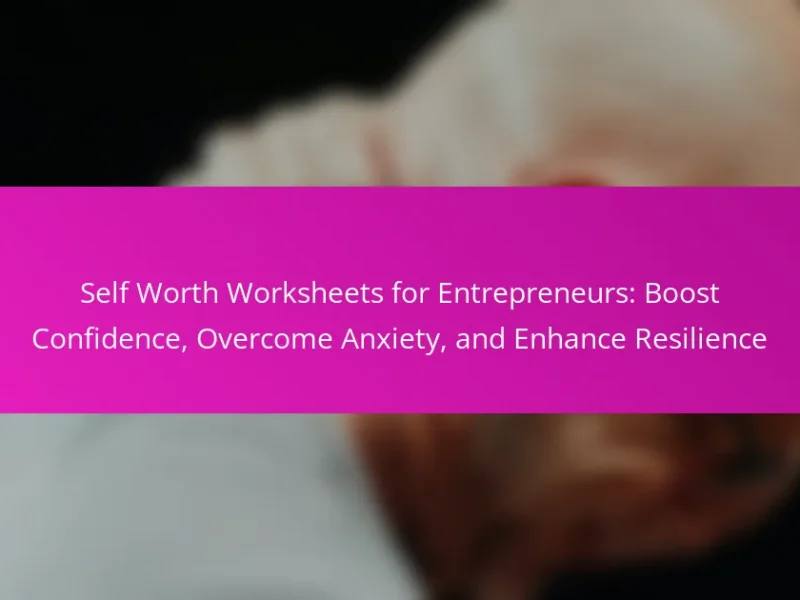Building trust with clients is essential for entrepreneurs facing anxiety, stress, and isolation. This article explores the impact of mental health challenges on business, strategies for open communication, and the importance of personalized interactions. It highlights the role of transparency and active listening in fostering strong client relationships. By addressing these factors, entrepreneurs can create a supportive environment that enhances both their well-being and their clients’ trust.

What are the mental health challenges faced by entrepreneurs?
Entrepreneurs often face mental health challenges such as anxiety, stress, and isolation. These issues stem from the pressures of decision-making, financial uncertainty, and the demands of building a business.
Anxiety can manifest as constant worry about performance and outcomes, affecting both personal and professional life. Stress is frequently linked to long hours and the need to meet expectations, leading to burnout. Isolation arises when entrepreneurs feel disconnected from peers, lacking a support network.
Addressing these challenges involves building trust with clients, which can alleviate feelings of isolation. Open communication fosters relationships, creating a sense of community that counters loneliness.
Implementing strategies like mindfulness, seeking mentorship, and establishing a work-life balance can also mitigate anxiety and stress. Recognizing these mental health challenges is crucial for long-term success and well-being as an entrepreneur.
How does anxiety affect client relationships?
Anxiety can significantly undermine client relationships by creating barriers to effective communication and trust. It may lead to misunderstandings, reduced responsiveness, and an inability to engage authentically. Clients may perceive anxious behaviors as unprofessional or unreliable, which can damage long-term partnerships. Addressing anxiety through self-awareness and coping strategies can help entrepreneurs foster healthier client interactions.
What role does stress play in building trust?
Stress can undermine trust by creating anxiety and reducing effective communication. When entrepreneurs manage stress, they foster a supportive environment that encourages open dialogue. This transparency builds rapport, allowing clients to feel secure in their relationships. Moreover, demonstrating resilience in stressful situations can enhance credibility, making clients more likely to trust the entrepreneur’s decisions.
How does isolation impact entrepreneurial effectiveness?
Isolation negatively affects entrepreneurial effectiveness by diminishing motivation, reducing creativity, and impairing decision-making. Entrepreneurs may experience heightened anxiety and stress, leading to decreased productivity. Social interactions foster collaboration and innovation, which isolation undermines. Building trust with clients becomes challenging without a supportive network, impacting long-term business relationships. Engaging with peers can alleviate these effects, enhancing overall effectiveness.
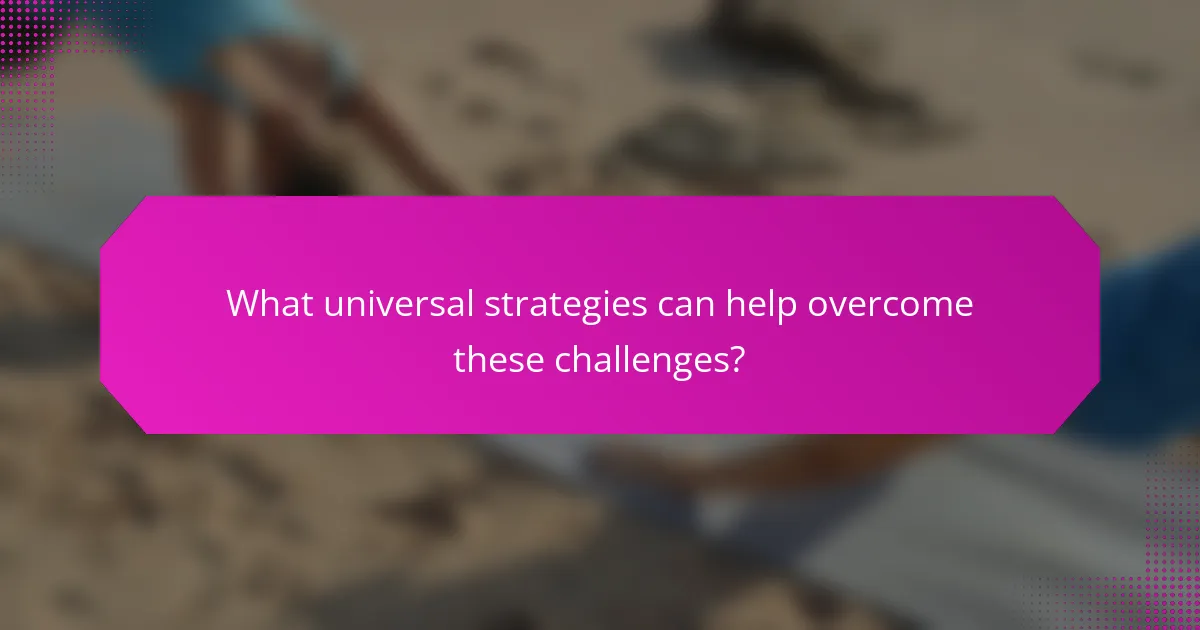
What universal strategies can help overcome these challenges?
Building trust with clients involves consistent communication, transparency, and empathy. Establish regular check-ins to address concerns and provide updates. Share success stories to illustrate reliability. Foster a supportive environment by actively listening to client feedback. Use personalized interactions to strengthen relationships, as these create a sense of connection.
How can effective communication reduce anxiety?
Effective communication can significantly reduce anxiety by fostering understanding and trust. Clear dialogue helps clarify expectations, alleviating fears associated with uncertainty. As a result, entrepreneurs can build stronger relationships with clients, which minimizes feelings of stress and isolation. Active listening and empathetic responses further enhance this connection, creating a supportive environment that encourages open expression of concerns. This unique approach not only addresses immediate anxieties but also cultivates long-term trust.
What stress management techniques are effective for entrepreneurs?
Mindfulness meditation, physical exercise, and time management are effective stress management techniques for entrepreneurs. Mindfulness meditation enhances focus and reduces anxiety, while physical exercise boosts mood and energy levels. Time management strategies, such as prioritizing tasks, help prevent overwhelm and foster a sense of control. Implementing these techniques can improve overall well-being and client relationships.
How can networking alleviate feelings of isolation?
Networking can significantly reduce feelings of isolation by fostering connections and building supportive relationships. Engaging with others creates a sense of belonging, which is crucial for mental well-being. Regular interactions can lead to shared experiences, alleviating loneliness. Additionally, networking provides opportunities for collaboration, enhancing professional growth and emotional support. As a result, entrepreneurs can combat anxiety and stress effectively through these meaningful connections.
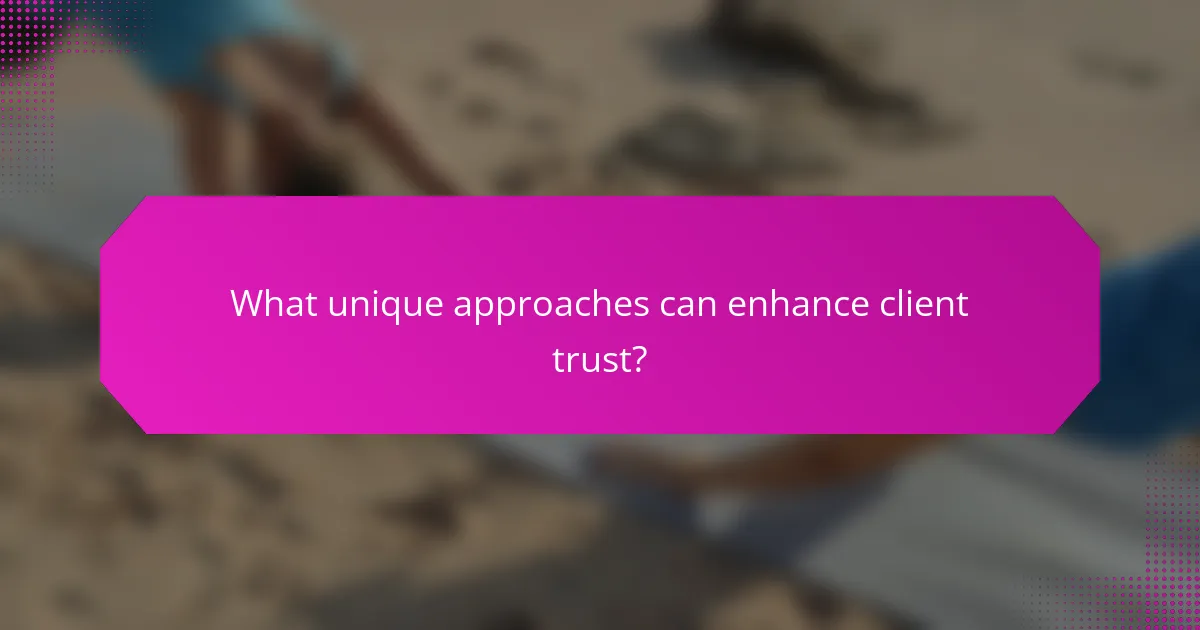
What unique approaches can enhance client trust?
Building client trust requires unique approaches that foster genuine connections. Personalization enhances relationships, making clients feel valued and understood. Transparency in communication builds credibility, allowing clients to see the business’s integrity. Regular feedback loops create engagement, showing clients their opinions matter. Additionally, consistency in service delivery reinforces reliability, which is crucial for long-term trust.
How does vulnerability foster deeper connections?
Vulnerability fosters deeper connections by allowing authenticity and empathy to thrive. When entrepreneurs share their challenges, clients feel understood and valued. This openness builds trust, which is essential for lasting relationships. As a result, clients are more likely to engage and invest in the entrepreneur’s vision.
What role does authenticity play in client trust?
Authenticity is crucial for building client trust as it fosters transparency and credibility. When clients perceive entrepreneurs as genuine, they feel more secure in their decisions. Authentic communication can reduce anxiety and isolation, enabling a stronger connection. As a result, clients are more likely to engage and remain loyal.
How can personal storytelling improve client relationships?
Personal storytelling can significantly enhance client relationships by fostering trust and connection. Sharing personal experiences allows entrepreneurs to reveal authenticity, making clients feel more engaged. This emotional resonance can alleviate anxiety and stress, leading to stronger bonds. As a result, clients are more likely to remain loyal and open in communication, ultimately benefiting the entrepreneurial journey.

What rare but effective tactics can entrepreneurs use?
Entrepreneurs can build trust by using transparency, active listening, and personalized communication. These rare tactics foster strong relationships. Transparency involves openly sharing business practices and challenges, which enhances credibility. Active listening shows clients their concerns are valued, creating a supportive environment. Personalized communication tailors interactions, making clients feel understood and appreciated. Implementing these tactics can significantly reduce anxiety, stress, and isolation for both entrepreneurs and clients.
How can mindfulness practices specifically benefit entrepreneurs?
Mindfulness practices can significantly benefit entrepreneurs by reducing anxiety, stress, and feelings of isolation. These practices enhance focus, promote emotional resilience, and improve decision-making. Regular mindfulness can lead to better client relationships, as entrepreneurs become more present and attentive. As a result, this fosters trust and loyalty among clients, which is crucial for long-term success.
What innovative tools are available for mental health support?
Digital platforms like therapy apps, online support groups, and mental wellness chatbots provide innovative tools for mental health support. These tools enhance accessibility and convenience for entrepreneurs facing anxiety, stress, and isolation.
Therapy apps offer features like guided meditations, mood tracking, and access to licensed therapists, addressing the unique needs of users. Online support groups create a sense of community, allowing entrepreneurs to share experiences and coping strategies. Mental wellness chatbots provide immediate assistance, offering resources and coping techniques in real-time.
Research shows that digital mental health tools can significantly reduce symptoms of anxiety and depression, making them a valuable resource for entrepreneurs. As a result, integrating these tools into daily routines can foster resilience and improve overall mental well-being.
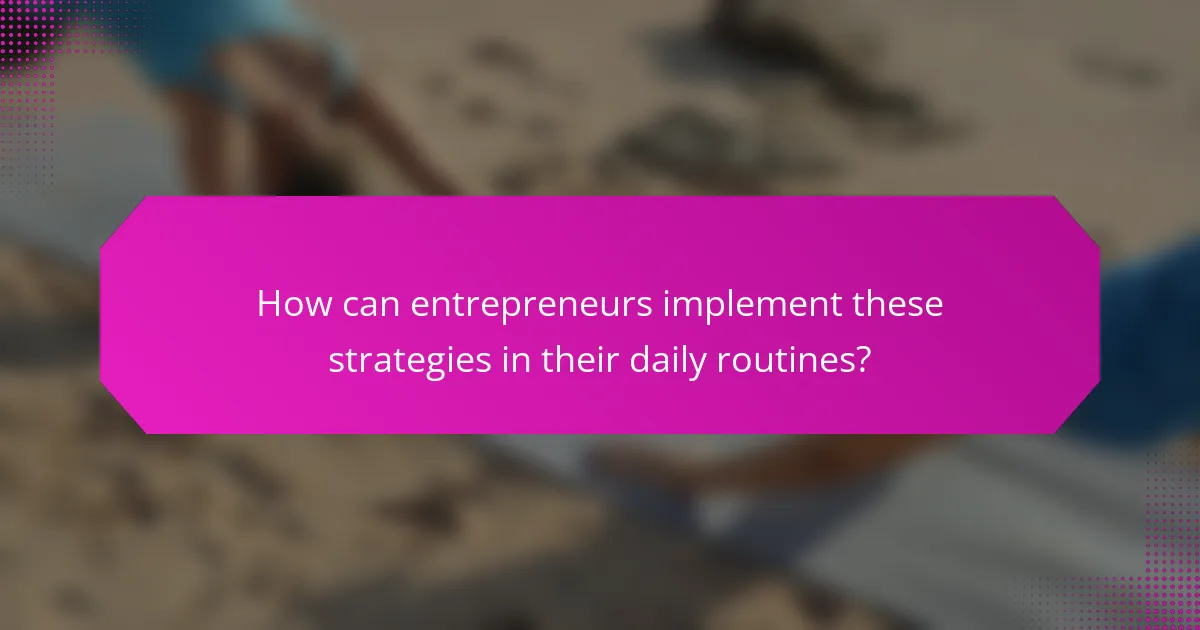
How can entrepreneurs implement these strategies in their daily routines?
Entrepreneurs can build trust with clients by integrating consistent communication, transparency, and empathy into their daily routines. Establish regular check-ins to address concerns promptly. Share updates about services or products openly to foster transparency. Practice active listening to understand client needs, which reduces anxiety and builds rapport. Additionally, create a supportive environment by acknowledging challenges faced by clients, demonstrating genuine care.
What are the best practices for maintaining mental health?
To maintain mental health as an entrepreneur, prioritize self-care, establish a support network, and practice mindfulness. Self-care includes regular exercise, a balanced diet, and sufficient sleep, which enhance overall well-being. Building a support network fosters connections, reducing feelings of isolation and anxiety. Mindfulness techniques, such as meditation, help manage stress and improve focus. Consistent engagement in these practices can lead to better mental resilience and trust with clients.
What common mistakes should entrepreneurs avoid?
Entrepreneurs should avoid common mistakes that undermine trust, such as poor communication, lack of transparency, and failing to deliver on promises. These errors can lead to client anxiety and stress. Establishing clear expectations and maintaining open dialogue fosters a trusting relationship. Regular updates and honest feedback strengthen this bond. Consistency in actions and reliability also enhance credibility.
How can entrepreneurs measure their progress in building trust?
Entrepreneurs can measure their progress in building trust by tracking client feedback, engagement levels, and repeat business. Regular surveys can provide insights into client satisfaction, while monitoring communication frequency helps assess relationship strength. An increase in referrals indicates growing trust.
What expert insights can guide entrepreneurs in overcoming mental health challenges?
Expert insights emphasize the importance of building a support network to combat mental health challenges. Entrepreneurs can benefit from seeking mentorship, participating in peer support groups, and prioritizing self-care practices. Establishing open communication with clients fosters trust, reducing feelings of isolation. Mindfulness techniques can help manage anxiety and stress, enhancing overall well-being. Regularly assessing mental health and seeking professional help when needed are crucial for sustaining entrepreneurial success.
